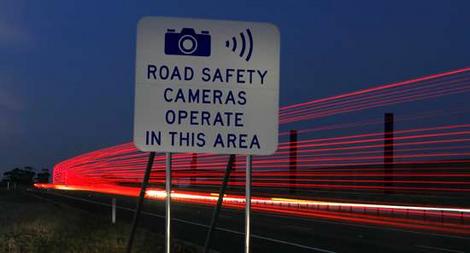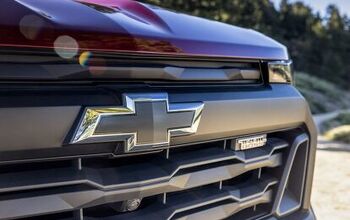Australian Appeals Court: Without Authentication Photo Tickets Are Hearsay
California courts are not alone in questioning the validity of red light camera and speed camera photographs as valid legal evidence. On Friday, the Queensland, Australia Court of Appeal ruled that automated ticketing cases require more than a pair of images in a folder to make a speeding case that will stick. The motorist, a non-lawyer, won her case against the government with only the help of her husband.
A camera accused Bilyana LeKich of driving 114 km/h (70 MPH) in a 100 zone (62 MPH) on Bruce Highway in Burpengary on September 4, 2008. Lekich pleaded not guilty in Caboolture Magistrate’s Court where a judge did little more than look at the photos and declare that she was guilty and must pay A$200. LeKich appealed to a district court which overturned this conviction on the grounds that the photos should not have been entered as evidence.
Under Australian law, the police commissioner must certify the photographs as “properly taken” at the time and location stated on the citation. The commissioner can delegate this power to another police officer, but the prosecution never offered any evidence that the power had been properly delegated — other than the fact that a police officer’s signature on the ticket was proof that the power had been delegated. The lower court judge did not buy the argument.
“The starting point, of course, for any criminal prosecution is that the evidence is to be given orally,” the Brisbane District Court judge ruled last year. “Evidence in writing is prima facie hearsay and is inadmissible unless it comes within a statutory exception to the rule against hearsay…. There is certainly nothing in s. 120 of the act which permits the delegate to certify to the existence of the delegation where the commissioner’s power has been delegated.”
As hearsay, the photographs were inadmissible and Queensland Police Service was left with nothing to prove a case against LeKich. Court of Appeal Justice Hugh B. Fraser, writing for the three-judge panel, agreed with the district court findings because proper procedure is important when a signature constitutes automatic proof.
“The consequences of a delegation by the commissioner are by no means insignificant,” Fraser wrote. “It arms a police officer with power to provide prima facie proof of an offense merely by signing a certificate which s. 120 otherwise requires to be signed by the commissioner. It does not seem unduly pedantic to insist upon proof of such a delegation where as the primary judge explained, the applicant [Queensland Police Service] could have taken advantage of the simple mode of proof which the legislature has provided.”
A copy of the decision is available in a 150k PDF file at the source link below.
Dixon v. LeKich (Court of Appeal, Queensland, Australia, 8/13/2010)
[Courtesy: Thenewspaper.com]
More by The Newspaper
Latest Car Reviews
Read moreLatest Product Reviews
Read moreRecent Comments
- Fred I would get the Acura RDX, to replace my Honda HR-V. Both it and the CRV seats are uncomfortable on longer trips.
- RHD Now that the negative Nellies have chimed in...A reasonably priced electric car would be a huge hit. There has to be an easy way to plug it in at home, in addition to the obvious relatively trickle charge via an extension cord. Price it under 30K, preferably under 25K, with a 200 mile range and you have a hit on your hands. This would be perfect for a teenager going to high school or a medium-range commuter. Imagine something like a Kia Soul, Ford Ranger, Honda CR-V, Chevy Malibu or even a Civic that costs a small fraction to fuel up compared to gasoline. Imagine not having to pay your wife's Chevron card bill every month (then try to get her off of Starbuck's and mani-pedi habits). One car is not the solution to every case imaginable. But would it be a market success? Abso-friggin-lutely. And TTAC missed today's announcement of the new Mini Aceman, which, unfortunately, will be sold only in China. It's an EV, so it's relevant to this particular article/question.
- Ajla It would. Although if future EVs prove relatively indifferent to prior owner habits that makes me more likely to go used.
- 28-Cars-Later One of the biggest reasons not to purchase an EV that I hear is...that they just all around suck for almost every use case imaginable.
- Theflyersfan A cheaper EV is likely to have a smaller battery (think Mazda MX-30 and Mitsubishi iMEV), so that makes it less useful for some buyers. Personally, my charging can only take place at work or at a four-charger station at the end of my street in a public lot, so that's a crapshoot. If a cheaper EV was able to capture what it seems like a lot of buyers want - sub-40K, 300+ mile range, up to 80% charging in 20-30 minutes (tops) - then they can possibly be added to some lists. But then the issues of depreciation and resale value come into play if someone wants to keep the car for a while. But since this question is asking person by person, if I had room for a second car to be garaged (off of the street), I would consider an EV for a second car and keep my current one as a weekend toy. But I can't do a 50K+ EV as a primary car with my uncertain charging infrastructure by me, road trips, and as a second car, the higher insurance rates and county taxes. Not yet at least. A plug in hybrid however is perfect.


































Comments
Join the conversation
Although this method is controversial, it does decrease the amount of speeders which is one goal of these cameras. Sure the gov income is nice, but maybe they expected to lose some cases.
you Americans will probably be quite bemused to find that people in the state of Victoria are often put under a 4km/h leeway... that is if you do 64km/h in a 60 zone, you will receive a fine. for you imperial folk that is 2.5 mph margin of error that is of course amazing you will also find that many European cars often calibrate their speedos to 30-50-70-90km/h increments which makes this margin impossible to gauge